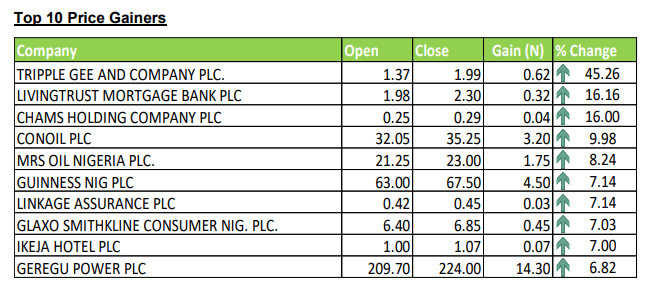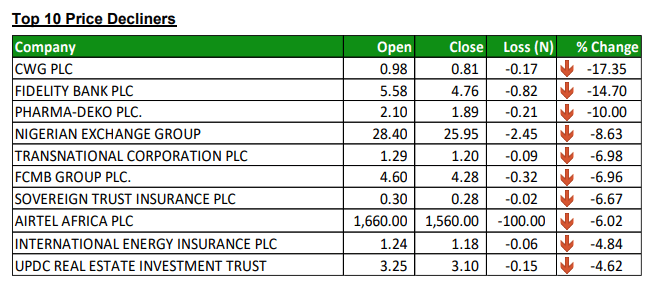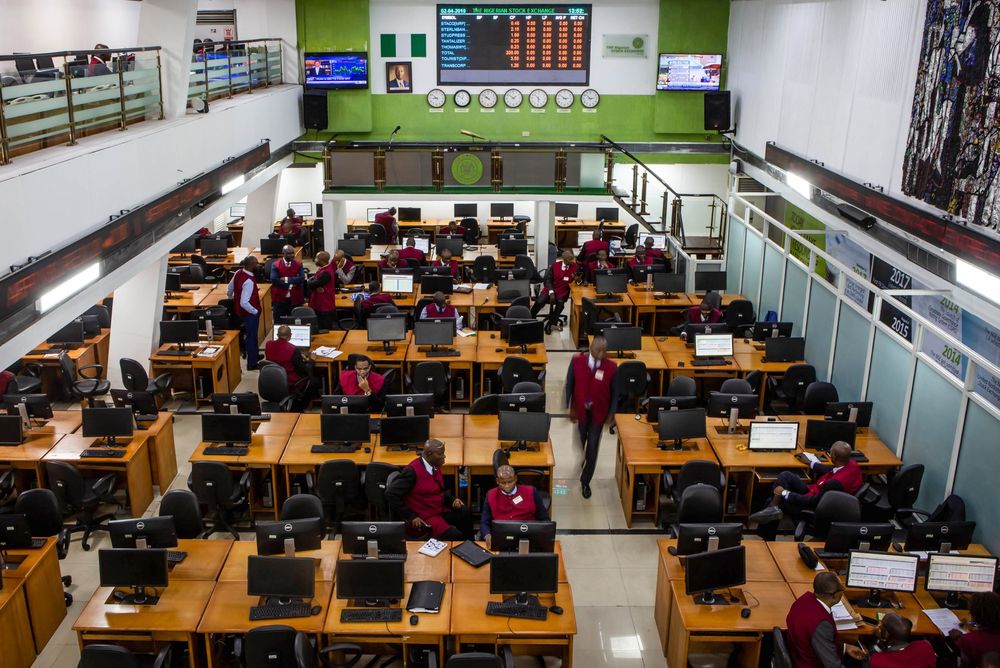The Nigerian Stock Market dipped last week as the Central Bank of Nigeria (CBN) implemented further tightening measures to address rising inflation.
The Nigerian Exchange Limited (NGX) All-Share Index (ASI) and Market Capitalisation both depreciated by 0.52% to close the week at 97,612.51 points and N55.218 trillion, respectively.
This decline in the market coincided with the Monetary Policy Committee (MPC) of the CBN’s decision to hike the policy rate by 150 basis points (bps) to 26.25%.
The committee also retained the cash reserve ratio (CRR) for deposit money banks at 45%, the asymmetric corridor at +100bps/-300bps, and the liquidity ratio at 30%.
“The market remains under pressure as investors pursue safety in the fixed income space. However, given the strong sell-side action in the banking space, we anticipate some buy-side action in the coming week as traders seek to take advantage of some stocks that have been beaten down in recent sessions,” noted analysts from Lagos-based Vetiva Research in their May 24 report.
Despite the overall market downturn, certain sectors showed resilience.
Indices such as NGX MERI Value, NGX Consumer Goods, NGX Oil and Gas, NGX Lotus II, and NGX Industrial Goods saw gains of 1.74%, 0.31%, 0.72%, 0.44%, and 0.19%, respectively.
The NGX ASeM index, however, closed flat.
A closer look at the week’s trading activities revealed that twenty-four equities appreciated in price, down from twenty-eight in the previous week.
Conversely, fifty-three equities saw a decline in price, an increase from fifty-one in the preceding week, while seventy-seven equities remained unchanged, slightly up from seventy-six.
The financial services industry led the trading activity with 1.577 billion shares valued at N30.359 billion traded in 20,697 deals, accounting for 79.41% and 74.56% of the total equity turnover volume and value, respectively.
The conglomerates industry followed with 125.342 million shares worth N1.387 billion in 2,283 deals.
The consumer goods industry also recorded significant activity, with a turnover of 77.327 million shares worth N2.446 billion in 4,916 deals.
Among individual equities, Ecobank Transnational Incorporated Plc, Access Holdings Plc, and United Bank for Africa Plc were the top three in terms of trading volume, accounting for 1.006 billion shares worth N20.115 billion in 6,849 deals.
This represented 50.67% and 49.40% of the total equity turnover volume and value, respectively.
Also, 5,340 units of exchange-traded products valued at N2.350 million were traded in 111 deals, compared to 4,103 units valued at N2.429 million in 110 deals the previous week.
The bond market also saw significant activity, with 82,778 units valued at N80.570 million traded in 18 deals, compared to 9,282 units valued at N8.945 million traded in 24 deals the preceding week.
The MPC’s decision to raise interest rates is part of a broader strategy to rein in inflation and stabilize the economy.
However, the immediate impact on the stock market has been negative, as investors seek safer investments in the fixed income space.
Market participants will be closely watching the coming weeks for potential buy-side opportunities and further economic indicators that could influence trading strategies.
As the Nigerian stock market navigates these turbulent times, the actions of the CBN and global economic conditions will continue to play pivotal roles in shaping market dynamics.
Investors are advised to stay informed and consider the long-term implications of these policy decisions on their portfolios.


 Naira4 weeks ago
Naira4 weeks ago
 Naira3 weeks ago
Naira3 weeks ago
 Naira3 weeks ago
Naira3 weeks ago
 Naira3 weeks ago
Naira3 weeks ago


 Naira2 weeks ago
Naira2 weeks ago




 Naira3 weeks ago
Naira3 weeks ago
 Jobs4 weeks ago
Jobs4 weeks ago


 Banking Sector4 weeks ago
Banking Sector4 weeks ago
















